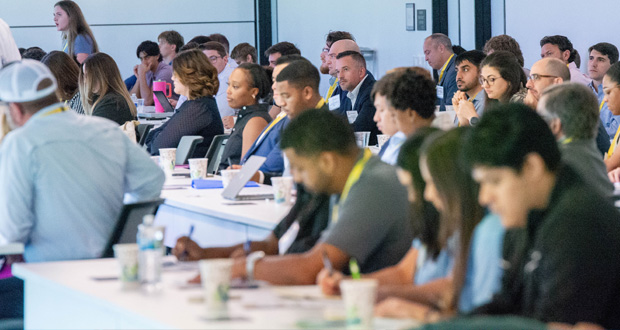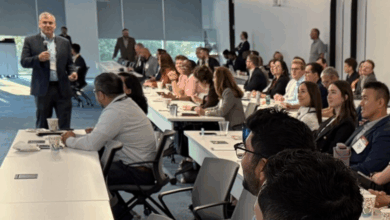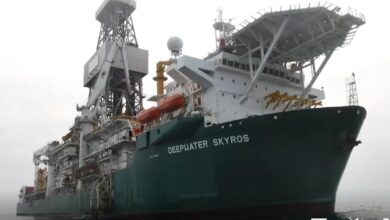Field experience, connecting with rig crews critical for young engineers to develop careers
Young professionals stand to benefit from time on the rig, gaining a better understanding of the systems and people that make industry go

By Stephen Whitfield, Senior Editor
Automation and digitalization are coming to define the oilfield of the future. The students and young professionals coming into the industry now are being trained to develop and operate the systems that will push drilling into the next several decades.
However, while companies are trying to attract the big brains into the fold, there is still a ton of value in the brawn. The roughnecks, floorhands, derrickhands and other crew members working with the physical equipment in the field are the engine that make this industry go, said Kenny Baker, Director of Personnel Development at Cactus Drilling.
Speaking to a room of young professionals at IADC’s inaugural Young Professionals Summit on 1 August in Houston, Mr Baker emphasized the importance for young petroleum engineers and students to take on internships and find their way onto the rig. Spending time in the field, he said, is vital.
“Put your boots on. If you don’t have boots, go ahead and get them and get out there in the field, because that’s where it’s at,” he said. “You guys are making up things on the computer that I’m really excited to see, but you still need to pay attention to those who are working on the rig. If you’re going to be a petroleum engineer, if you want to be a drilling engineer, you’ll see that the old guys who are out there may not have a college education, but they have lots of knowledge. Listen to them. You will make lifelong friends out there. If you’re working on a project, you can always call and tell them what you’re doing. If they can, they will help you.”
Mr Baker’s presentation at the summit focused on the steps that engineering students and young professionals need to take to build a thriving career. Notably, he listed mentorship as a top priority. Regardless of where young professionals hope to end up in their careers, whether they want to be a rig superintendent or someone building machine learning algorithms for automation systems, experienced rig personnel have a wealth of knowledge that can be crucial in helping them understand the steps they need to take to get where they want to go.
He spoke of his own path into the industry as a young floorhand working for Cactus in the early 2000s as an example of the value of mentorship.
“I wasn’t the best high school student in the world, but when I got in the oilfield, I found guys that molded me into the person I am now. You have to be picky. Try to find somebody that you really look up to. You want to learn from people that are willing to push you, engage with you, try to get the best out of you. Those are the kinds of people you want to be around. Be willing to listen to the stories that these old company men tell. You can learn a lot of stuff from just the stories that they tell. Take notes, write it down,” Mr Baker said.
While being around experienced people on the rig is vital to developing a young person’s career, mentorship by itself isn’t as effective unless that young person knows how to get information out of those experienced people.
“We tell our guys out in the field all the time, don’t do something half-cocked,” he said. “You don’t know what I’m doing? Ask. If they walk away and you don’t understand what he said, ask again. We need to keep asking questions so that we can be sure we’re doing things the right way. Don’t underestimate us. We’re pretty smart people. We’ve got passion. We love to make connections. If you start asking us questions, we’ll start bouncing. Those dudes will get right in the middle of things and tell you what you need to know.”
Mr Baker also stressed the importance of working hard and being coachable in helping young professionals stand out early in their careers. He pointed out that young engineers coming into the industry are often not given the job they ultimately want to have – like with many other industries, new entrants have to start at a lower-level position and make their way up. Excelling at those lower-level positions will gain the attention of the higher-ups within an organization.
“If you’re not applying yourself 100%, it’s hard to move up,” he said. “If you get on the rig and they make you a floorhand, get good at being a floorhand. If you’re good at that, what do they do? They bump you up to motors. As soon as you get good at motors, what do they do? They bump you up to the derrick. They keep you seeking more experience, more knowledge, and that helps somebody to keep driving. You get used to going up the ladder.”
By seeking out mentors, asking questions and gaining attention from supervisors, young professionals can go a long way toward building a network to help them advance within the industry.
“If you’re shy, quit being shy,” he said. “You need to build that network, because you never know who might help you in the future. The only thing that a drilling rig can do by itself is rust. You have to stay focused on the people, those guys out there making a living. They’re working really hard from sun-up to sundown. As you move up and you’re making decisions that affect those people, you need to make sure that we’re doing the right thing.”
In addition to stressing the importance of getting to know people on the rig, Mr Baker also pointed out the need for young engineers to keep people first as they move into decision-making positions. This mindset can lead to major improvements in several areas on the rig, including rig safety. He gave an example of one instance from his days as a drilling superintendent. In 2007, a tornado in Oklahoma blew away a trailer house at a rigsite on which he was working, killing a companyman and injuring another individual.
The incident led Kathy Willingham, VP of Human Resources and HSE at Cactus Drilling, to look into ways to anchor the change house as a means of preparing for future tornadoes. Cactus Drilling ultimately spent around $500,000 to anchor its rig change houses to withstand an F5 tornado. In 2011, a Cactus rig in Oklahoma suffered a direct hit by a tornado that led to significant damage, but no one was hurt.
“Do you realize that, 15 years ago, we didn’t have any tornado shelters in Oklahoma on the rig? Those are the kinds of things that we need to be thinking about. You have to always think about the people. Always try to figure out stuff that you can do to help them,” he said. DC




